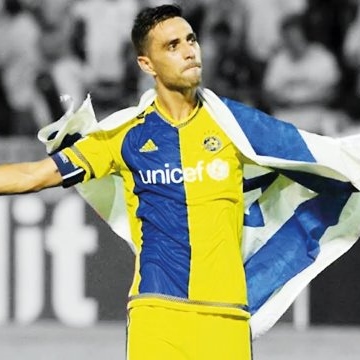
News

What are Israel’s chances in European soccer?
LUKE ALFRED
One might, indeed, need to go back to the 1970s to find a player with a compelling claim to be top of the list. His name was Mordechai Spiegler – sometimes spelled Shpigler – and he played internationally for Paris Saint-Germain.
Later, he played briefly alongside Pele at New York Cosmos, so could clearly mix it with the best of them in what was a golden age for Israeli football.
Spiegler’s resume makes for interesting reading. Essentially a forward, but capable of playing elsewhere, he captained the Israeli Olympic side to the 1968 Games in Mexico City, where they reached the quarter-finals.
Two years later, Israel played in their one and only World Cup, a showpiece event once again being hosted by Mexico, where he scored Israel’s only World Cup goal in their 1-1 draw with Sweden, a beautifully struck left-footed drive from way outside of the area that curled beyond the Swedish keeper’s despairing lunge.
There is debate about Spiegler’s international goal-scoring record because some of his goals appear to have been scored in friendlies that weren’t sanctioned by FIFA. And, yes, it’s true, that some of these goals were scored against the small fry of the international game like Hong Kong, Ceylon (as it then was) and Ethiopia, but he also scored goals against Uruguay, Switzerland, Northern Ireland, and Yugoslavia.
In playing 83 times for his country, he was the real deal.
The “age of Spiegler” (and other Israeli players of the same age like Itzhak Shum) is again being evoked in contemporary football circles. In Haifa in March, Israel beat Austria 4-2 thanks to an Eran Zahavi hat-trick to go to second place in qualifying Group G for next year’s European Championships.
For the first time ever, these championships will neither be hosted nor co-hosted, being spread across 12 European cities next European summer, a one-off gesture of “romance” to celebrate the 60th anniversary of the competition, according to UEFA (Union of European Football Association) boss Michel Platini.
Israel hadn’t beaten Austria in 20 years of trying, the win probably having something to do with the inside knowledge of their Austrian coach, Andreas Herzog. This aside, even the usually sober Times of Israel felt compelled to dub it “one of the best from the national team in recent years”.
Both the Austria game and Israel’s Euro opener against Slovenia (a 1-1 draw) were played in Haifa, but the real test of their pedigree will come next week, when they play two away games in quick succession: against Latvia on 6 July and, 72 hours later, when they take on group leaders, Poland, in Warsaw’s National Stadium.
The two qualifiers are unlikely to be definitive, but they will be clarifying. Both Israel’s opening games were at home, and two away games in four days is a tough ask. We will know in ten days’ time whether Herzog and his team’s quick start to their campaign provide cause for genuine optimism, or whether the national side will simply fade into mid-table obscurity as the year progresses. This is exactly what they did during the Euro qualifying campaign in 2016.
Log-leaders Poland will provide them with a stern test. The Poles kicked off their campaign with a priceless 1-0 away win against Austria in Vienna in March, following it up with a 2-0 home victory against Latvia in their second qualifier three days later.
Having lost to both North Macedonia and the Poles in their opening two fixtures, Latvia are without a point in the six-team qualifying group, and are anchored to the bottom of the table.
Then again, both of their opening ties were played away. Their game against Israel is at home, in Riga, where they might give a better account of themselves, although the Israelis will, of course, be hoping otherwise.
Coach Herzog surely had in mind maximum points from such a tie when he said after the draw for the qualifying group was made last year that while Poland and Austria were obvious favourites, the group contained space for the dreams of others. “It’s not an easy group,” he said at the time. “But it’s a group where a lot of teams have chances where, if they play at the highest level, they can get some wins.”
One of Herzog’s first big decisions after taking charge as national coach was to recall Zahavi for Israel’s Nation’s League campaign – this after he had “retired” from the game after throwing the captain’s armband to the ground in disgust after Israel’s defeat by Macedonia in September 2017.
With the China-based Zahavi scoring four goals in Israel’s two Euro qualifiers so far, Herzog’s decision has been thoroughly vindicated. The coach is a self-confessed Zahavi fan, and will be hoping he can add to his four goals in either Riga or Warsaw, but preferably both.
With it, Zahavi could well climb to the top of the Spiegler list.




